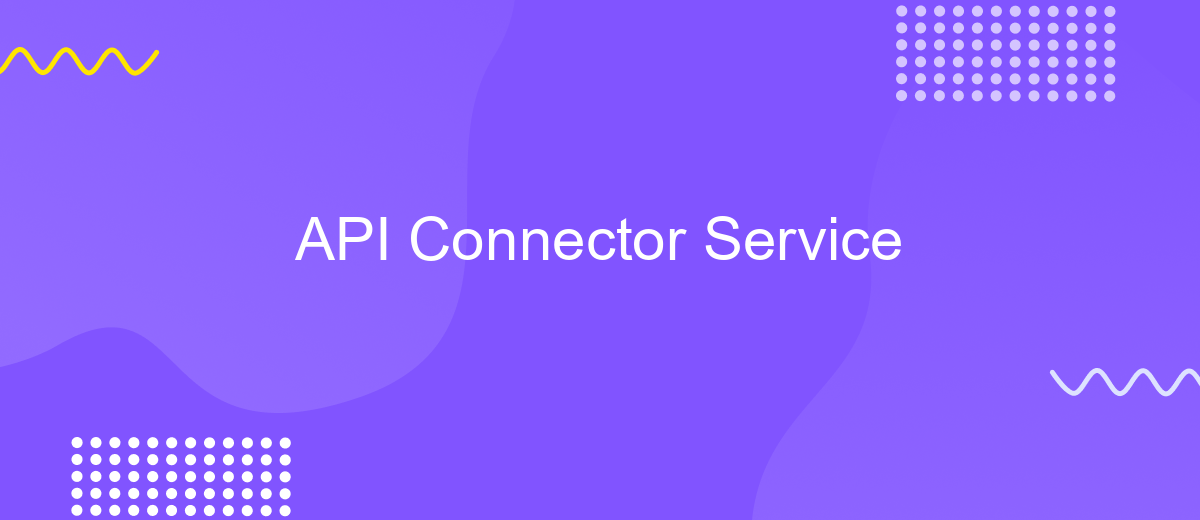API Connector Service
In today's rapidly evolving digital landscape, seamless integration between applications is crucial for business efficiency and innovation. An API Connector Service plays a vital role in this ecosystem by enabling disparate systems to communicate effortlessly. By bridging the gap between various software applications, it streamlines data exchange, reduces manual intervention, and accelerates workflow automation. This article explores the benefits and functionalities of API Connector Services in modern enterprises.
API Connector Service Overview
The API Connector Service is a crucial component in modern software architecture, providing seamless integration between diverse applications and services. This service acts as a bridge, allowing different systems to communicate effectively, regardless of their underlying technology or platform. By leveraging API Connector Service, businesses can streamline operations, enhance data exchange, and improve overall system efficiency.
- Facilitates communication between disparate systems.
- Enhances data integration and accessibility.
- Supports a wide range of protocols and data formats.
- Improves system scalability and flexibility.
- Ensures secure data transmission and handling.
Implementing an API Connector Service enables organizations to unlock the full potential of their existing infrastructure. It reduces the complexity of managing multiple interfaces and promotes a more agile development environment. As a result, companies can focus on innovation and delivering value-added services to their customers, while maintaining a robust and interconnected digital ecosystem.
Benefits and Features

API Connector Service offers a robust solution for seamless integration across various platforms, streamlining data exchange and enhancing operational efficiency. By automating the connection between different applications, businesses can eliminate manual data entry, reducing errors and saving valuable time. This service provides a user-friendly interface that allows even non-technical users to set up integrations quickly. With its scalable architecture, businesses can easily adapt to changing demands and expand their integration capabilities as needed.
One of the standout features of API Connector Service is its ability to support a wide range of applications and services, including popular platforms like Salesforce, Google Sheets, and more. For instance, ApiX-Drive offers a versatile API connector that simplifies the integration process, providing pre-built templates and real-time data synchronization. This ensures that businesses can maintain up-to-date information across all systems, facilitating informed decision-making and improved collaboration. Additionally, the service includes robust security measures, ensuring that data transfers remain secure and compliant with industry standards.
Architecture and Implementation

The architecture of the API Connector Service is designed to provide seamless integration between various systems and applications. It employs a microservices-based approach, ensuring scalability and flexibility. Each microservice handles specific tasks, such as authentication, data transformation, or communication with external APIs, allowing for modular development and easy maintenance. The use of RESTful APIs facilitates interaction with external systems, while an internal message queue manages data flow between microservices, ensuring efficient and reliable data exchange.
- Authentication Service: Manages user authentication and authorization, ensuring secure access to the API Connector Service.
- Data Transformation Module: Converts data formats between different systems, ensuring compatibility and smooth data flow.
- External API Handler: Manages communication with third-party APIs, handling requests and responses efficiently.
- Message Queue: Ensures reliable data exchange between microservices, preventing data loss and improving system resilience.
Implementation of the API Connector Service leverages cloud-native technologies, enabling dynamic scaling based on demand. Continuous integration and deployment (CI/CD) pipelines are employed to streamline updates and feature releases, ensuring the service remains robust and up-to-date. This architecture not only enhances interoperability but also provides a secure, efficient, and flexible solution for modern API integration needs.
Use Cases and Examples

API Connector Service is a versatile tool that facilitates seamless integration between disparate software systems. By acting as a bridge, it enables data exchange and communication across multiple platforms, enhancing workflow efficiency and reducing manual intervention. This service is crucial for businesses aiming to streamline operations and improve data accessibility.
One common use case for API Connector Service is in e-commerce platforms. It allows these platforms to sync inventory, orders, and customer data with third-party applications such as payment gateways and shipment providers. This ensures real-time updates and a smooth customer experience.
- Integrating CRM systems with marketing automation tools to synchronize customer data.
- Connecting IoT devices to centralized data dashboards for real-time monitoring.
- Linking financial systems with accounting software for automated reporting.
By utilizing API Connector Service, companies can significantly reduce the complexity of managing multiple software applications. This service not only enhances operational efficiency but also offers scalability and flexibility, allowing businesses to adapt quickly to changing technological landscapes. As a result, organizations can focus on core activities while ensuring robust and reliable data management.


Best Practices and Considerations
When implementing an API Connector Service, it's crucial to prioritize security and data privacy. Ensure that all API keys and credentials are stored securely, and use encryption to protect sensitive information during transmission. Regularly audit and update your security protocols to address any potential vulnerabilities. Additionally, consider implementing rate limiting to prevent abuse and ensure that your service remains reliable and available to all users.
Another important consideration is the ease of integration and scalability. Choose a service like ApiX-Drive, which offers user-friendly tools for setting up integrations without extensive coding knowledge. This can significantly reduce the time and effort required to connect various applications. Additionally, plan for scalability by selecting a solution that can handle increased data loads as your business grows. Testing your integrations thoroughly before deploying them in a production environment will help identify any issues early, ensuring a smooth and efficient operation.
FAQ
What is an API Connector Service?
How does an API Connector Service work?
What are the benefits of using an API Connector Service?
Do I need technical skills to use an API Connector Service?
Can I connect multiple applications using an API Connector Service?
Time is the most valuable resource for business today. Almost half of it is wasted on routine tasks. Your employees are constantly forced to perform monotonous tasks that are difficult to classify as important and specialized. You can leave everything as it is by hiring additional employees, or you can automate most of the business processes using the ApiX-Drive online connector to get rid of unnecessary time and money expenses once and for all. The choice is yours!

